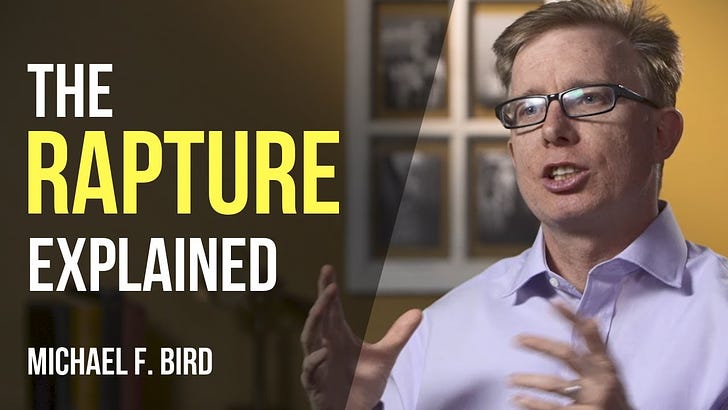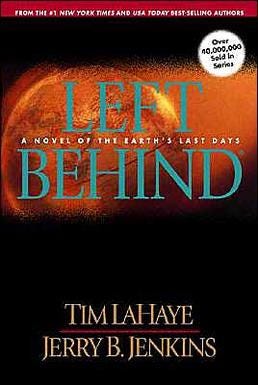What is the Rapture?
In some Christian schemes of the end-times, there is a thing called the “rapture,” where the church (i.e., true believers) will be raptured up to heaven at the Lord’s first return. Then, after seven years of tribulation, the Lord will return again with the church, to usher in a millennial reign on earth. This is partly derived from 1 Thess 4:13-18:
13 But we do not want you to be uninformed, brothers and sisters, about those who have died, so that you may not grieve as others do who have no hope. 14 For since we believe that Jesus died and rose again, even so, through Jesus, God will bring with him those who have died. 15 For this we declare to you by the word of the Lord, that we who are alive, who are left until the coming of the Lord, will by no means precede those who have died. 16 For the Lord himself, with a cry of command, with the archangel’s call and with the sound of God’s trumpet, will descend from heaven, and the dead in Christ will rise first. 17 Then we who are alive, who are left, will be caught up in the clouds together with them to meet the Lord in the air, and so we will be with the Lord forever. 18 Therefore encourage one another with these words. (NRSVu)
This type of end-times thinking is associated with Dispensational theology and was popularized by the Left Behind books and movies.
I made a video with Zondervan about the rapture, arguing that the Lord’s return will not be broken up into two stages, but is a single event, so there’s no wafting up of the church out of the world to escape tribulation:
What is “Rapture Trauma”?
The weird thing is that CNN did an article on how some Christians - or those who were raised Christian - were traumatized by the belief that the true believers were going to be suddenly raptured and the rest would be left behind to face the Great Tribulation. This created a manic fear of being “Left Behind.” They describe rapture trauma or anxiety this way:
“Rapture anxiety,” as it is often called, is recognized by some faith experts and mental health professionals as a type of religious trauma. Darren Slade, the president and CEO of the Global Center for Religious Research, has been studying religious trauma across several faiths and denominations for years.
“This is a real thing. It’s a chronic problem,” he says of rapture anxiety. “This is a new area of study, but in general, our research has revealed that religious trauma leads to an increase of anxiety, depression, paranoia and even some OCD-like behaviors: ‘I need to say this prayer of salvation so many times,’ ‘I need to confess my sins so often.’”
“Now imagine,” he continues, “You are taught that at any minute, you could be left here on Earth. What does that do to the teenager who just had premarital sex, or even simply took the Lord’s name in vain?”
I get where they are coming from. I wasn’t raised Christian. But several older friends have told me of the terror and trauma they felt from watching the 1970s Evangelical Horror film “Thief in the Night” which tried to scare teenage children that the Lord could return at literally any moment, and if they weren’t sincere in their faith, they’d be “left behind.” Every time a kid came home from school and couldn’t find their parents or siblings, they did start to wonder if they’d missed the rapture!
But, if you think that’s weird, wait one more minute.
There is a thing called After the Rapture Petcare, where people can pay atheists money to look after their pets in the event that they are raptured. I’m pretty sure it’s a joke, but I do wonder how many legit inquiries they get!





Those of a "certain age" learned this in the impact of Salem Kirban who was then adjusted by Hal Lindsey's "Late Great Planet Earth," Tim LaHaye got it through the dispensational institutions and Jerry Jenkins wrote it up into the mega-selling series. The earliest phases of this stuff rooted phobias in communism, which shows just how theo-political this discussion has always been.
I can hardly say that I experienced "rapture trauma" as a teen or adult (although I grew up in the Plymouth Brethren who at least popularized and may have originated dispensationalism), but did experience well-meaning rapture child-abuse about age 5. Our small Brethren Assembly did have a Sunday School after "the Breaking of Bread" and I remember my Sunday School teacher telling us that if we did not "accept Jesus into our heart" or "ask Jesus into our heart" our parents could be raptured and we would be left behind. First, it was disorienting in that it drove a wedge between my parents' faith (and my father and mother had planted that assembly) and mine - I can never remember a time that I did not have a meaningful faith in Jesus, I had had Bible read to me starting at age 1 (it was done for my older brother, but my mother soon discovered that I was absorbing it too), and around age 4 I was participating in the "Breaking of Bread" as I could in that I had excitedly announced that I had "sung all the hymns" (I suspect it was from memory, for I doubt I was reading that well). Furthermore, we did not have an evangelistic service, so I had never heard that one had to pray the proper formula to "be saved." (I would learn: by age 8 or 9 I was giving a talk to a Bible Club banquet and then on radio on "the Wordless Book"). Then, second, the experience was traumatizing, for what could be more terrifying for a child than to be told that he might go to sleep and during the night his parents might be raptured and he would wake up all alone - all because he had not done something that he had never heard of? The teacher made the mistake of (1) not discovering the belief status of the students and (2) not discovering how her statements impacted the students. I was so terrified that I did not tell my parents. Instead, every night after lights were out and I was in bed (silently, or at least quietly, since my younger brother slept in the same room) I would pray "Jesus come into my heart" repeatedly until I fell asleep. I remember doing this for weeks. Of course, nothing "happened," for I was too traumatized to talk about it, and since I already had a deep and significant child's faith, Jesus was already in me through the Spirit. I think that somehow I eventually realized that I was OK or at least that I could not do anything about the situation, for I do not remember worrying about it later. And still later (probably earlier, but at least by the time I was a Child Evangelism Fellowship Summer Missionary at age 17) I would cite that even as my "conversion" when asked when it came about - yet within I knew that there had been no change in status in me, that I had always had faith, and that my answer was just to satisfy the questioner that I was really "in." I suspect that this trauma is why despite believing in the rapture up until seminary (Dr. Richard Longenecker had his students write a paper on the most significant passage without ever commenting on the topic himself, but this changed the beliefs of many, perhaps most, of us) I never got excited about Hal Lindsey and the like. I wanted to get my eschatology right (as the Brethren taught it for we knew we were right), but it was not a big thing. It would be decades later when I would label my experience "well-meaning spiritual child abuse," but by then I was Anglican/Episcopalian and understood what trauma was both theoretically (from psychology and counseling education) and experientially (from dealing with trauma survivors).